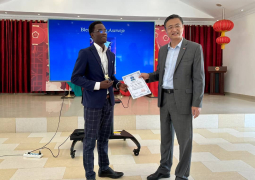
Mr. Jobe made this remark while delivering a statement during a high-level policy forum on Supporting MSME in the post COVID-19 era. The forum was organised by Ministry of Trade, Industry, Regional Integration and Employment in collaboration with UNDP and UNDESA at the Sir Dawda Kairaba International Conference Centre recently.
Mr. Jobe cited that it is encouraging that “we have seen in the budget the fruits of our consultations and engagement during the budgeting calendar.”
“We hope that this partnership faced with an existential threat would continue. As a backdrop to this forum we have observed the desire to build back better; to undertake adaptive measures in anticipation of a COVID world.
Mr. Jobe thus welcomed the initiative in taking “this highly felt need to explore options for revitalising the important MSME sector.”
“We thank the government for an overall budget that is very friendly to business. We noted the government is not burdening business with their fiscal ambitions. The budget proposed a slight 5% increase in revenue projection despite a 13% increase in expenditure.”
According to him, GCCI noted the rationalisation of subvention to government agencies representing 23 percent of domestic revenue. “More importantly than even the tax burden these subventions posed, it distorts competition and acts as a disincentive to innovation. We contend that Business is not the business of governments,” he stated.
He also cited that his institution has noted the reduction in the cost of incorporation and business registration and the elimination of payroll tax for the informal business and a reduction for the formal sector.
“We thank the minister for these. They were requested by GCCI for they directly go to the pocket of the workers in the private and informal sectors.”
“The face of the MSMEs in The Gambia are brave women in the markets, restaurants, ‘nacos’ and at the GCCI. We really applaud the cash support to the vulnerable communities.”
“These cash supports indirectly help the MSMEs for people would use it to buy goods and services from their neighbourhoods. We encourage the government to adopt this approach rather than sending the material support from Banjul and big business.”




